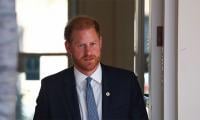PESHAWAR/ISLAMABAD: After losing human lives and $2.3 trillion, the US on Tuesday ended its longest ever war in Afghanistan by withdrawing troops from the Kabul airport. With it a new test begins for Taliban on making the new government, as the three-day Shura meeting on the issue ended on Tuesday without finalising the setup.
President Joe Biden oversaw the withdrawal of troops from Afghanistan on Monday when the last aircraft carrying military personnel left the Kabul airport. The Afghan Taliban said they facilitated the final operation that went smoothly and armed members of Badri 313, a highly trained commando force of the Taliban, entered the airport and took its control after the last aircraft departed from there.
Taliban militants celebrated the long-awaited US withdrawal with fireworks and gunfire in the middle of the night. The US had toppled the Taliban regime 20 years ago after accusing them of sheltering al-Qaeda leader Osama bin Laden. The US had accused bin Laden of being the architect of the 9/11 attacks.
The last US flight out of Kabul took off a minute before midnight local time Monday, ending a bloody war that brought misery to the Afghan nation as well as neighbouring countries, particularly Pakistan.
The Taliban, who are busy forming their government and naming ministers, said Afghanistan was declaring its "independence". “The US troops have left Afghanistan and our country has gained independence today. On this happiest day, we congratulate the Afghan nation for their sacrifices and determination,” Taliban spokesman Zabihullah Mujahid told The News.
In a statement, President Biden said the past 17 days have seen their troops execute the largest airlift in US history, evacuating over 120,000 US citizens, citizens of their allies, and Afghan allies of the US.
"Now, our 20-year military presence in Afghanistan has ended," he said, adding that he would address the nation on Tuesday. Zalmay Khalilzad, US special envoy for Afghan peace, tweeted that the military had "served with distinction and sacrifice to the very end" and that "they have our enduring gratitude and respect."
It seemed as if everything went as per a script as the Taliban entered the Hamid Karzai International Airport in Kabul to find abandoned military equipment left behind by the US. The Taliban leaders, escorted by the elite Badri 313 unit, inspected the airport.
They had taken local journalists to the airport and found that fighter jets, helicopters and cars had gutted. Anas Haqqani, a senior Taliban leader and former prisoner of Bagram airbase, told The News that before leaving the airport the US forces had damaged each and every thing that they could not take along with them. He shared some pictures and videos of the airport showing litter strewn across the ground around military aircraft riddled with visible holes.
The Pentagon said it made weapons and military equipment inoperable before they left, but didn’t destroy the airport so that the Taliban-run government could use it. More than 120,000 people were safely flown out of Afghanistan during the chaotic 18-day evacuation operation in Kabul, including around 6,000 Americans, Secretary of State Antony Blinken said Monday.
Talking to The News from Kabul airport, Anas Haqqani, a Taliban leader and the second-in-command of the Haqqani Network, considered to be the most formidable of the Taliban’s fighting force, said they had finally achieved what they had struggled for 20 years.
“What we achieved today is the result of the blood of thousands of mujahedeen. We have made history again,” he told The News. Haqqani said he lost 20 family members in the last two decades due to the war. “Afghanistan could not tolerate more war,” Anas Haqqani said.
Badri 313 force raised by Badruddin Haqqani took control of Kabul on August 15. “I was five-year old when the US invaded Afghanistan and toppled the Taliban government. I was raised in war and saw my family members, including my father late Maulvi Jalaluddin Haqqani, constantly fighting against the occupying forces to liberate our country,” he recalled.
“I had a strong belief in Allah Almighty that our sacrifices would force the foreign forces to leave our country,” he remarked. Anas Haqqani said he didn’t believe that Bagram airbase, where he was once held as a prisoner in solitary confinement for four years, would one day come under their control.
The Taliban have yet to formally declare their government or give more detail on how they will run Afghanistan beyond vague assertions of doing so in accordance with Islamic Shariah. Meanwhile, Taliban spokesman Zabihullah Mujahid said their top leadership, members of Rehbari Shura or leadership council concluded their three-day meeting in Kandahar to discuss important issues related to formation of their future government. Taliban supreme leader Sheikh Haibatullah Akhunzada chaired the Leadership Council meeting.
The spokesman said they presided over a three-day meeting of the Leadership Council that took decisions related to security, transparency in their governance and administrative affairs and protection of state resources.
Taliban said the meeting started on Saturday that also discussed formation of a new Islamic government and the cabinet members. According to sources, Taliban deputy chief Sirajuddin Haqqani and Taliban commander-in-chief Maulvi Mohammad Yaqoob were given the task to choose people for the cabinet. Taliban had initially stated they would form their government after withdrawal of the US troops, but insiders said it would take time to do so.
The Taliban said they want to have good relations with other countries, including the United States. Meanwhile, Taliban forces clashed with militia fighters in the Panjshir valley north of the Afghan capital Kabul on Monday night, in which eight Taliban members were killed, a representative of the main anti-Taliban opposition group said.
Fahim Dashti, a spokesman for the National Resistance Forces, a group loyal to local leader Ahmad Massoud, said the fighting occurred on the western entrance to the valley where he Taliban attacked NRF positions.
He said the attack, which may have been a probe to test the valley's defences, was repulsed with eight Taliban killed and a similar number wounded, while two members of the NRF forces were wounded.
Massoud, son of the former anti-Soviet mujahideen commander Ahmad Shah Massoud, has established himself in the Panjshir valley with a force of several thousand, made up of local militias and remnants of army and special forces units.
He has called for a negotiated settlement with the Taliban but has said his forces will resist if their province in the narrow and mountainous valley is attacked. A significant force of Taliban fighters has been moved to the area but the two sides have so far been engaged in negotiations and have avoided fighting.
Meanwhile, India’s ambassador to Qatar has held talks with a top Taliban leader, the Indian foreign ministry said, the first formal diplomatic engagement since the group took over Afghanistan.
The envoy, Deepak Mittal, met Sher Mohammad Abbas Stanekzai, the head of the Taliban’s political office, in Doha on Tuesday at the request of the Taliban, the foreign ministry said.
The foreign ministry said the two sides discussed the safety of Indians left behind in Afghanistan. Mittal also conveyed India’s fears that anti-India fighters could use Afghanistan’s soil to mount attacks, the foreign ministry said.
“The Taliban representative assured the ambassador that these issues would be positively addressed,” the foreign ministry said. Meanwhile, the UK foreign secretary Dominic Raab said the UK needs to face the "new reality" in Afghanistan and work with other nations to exercise a "moderating influence" on the Taliban.
Raab also defended his handling of the crisis, insisting that "no department has performed better than the Foreign Office and anyone trying to suggest otherwise" either lacked "credibility" or had been "peripheral" to events - and "should be focused on the job at hand".
Raab said the next "challenge" was to face Afghanistan's "new reality... and come up with a plan that reflects it". He said the UK needed to get "wider buy-in" from China, Russia and countries in Central Asia to exercise the "maximum moderating influence" on the Taliban and safeguard gains made over two decades, such as better access to education and lower maternal mortality rates.
Raab said the UK would "reserve the right" to take part in future air strikes in the country on the grounds of "lawful self-defence", especially when dealing with "terrorist groups". Earlier, during a briefing at the Pentagon, Army Maj Gen William D. "Hank" Taylor said the US will continue to have the ability to “defend ourselves” and to leverage over-the-horizon capability to conduct counter-terrorism operations as needed.







